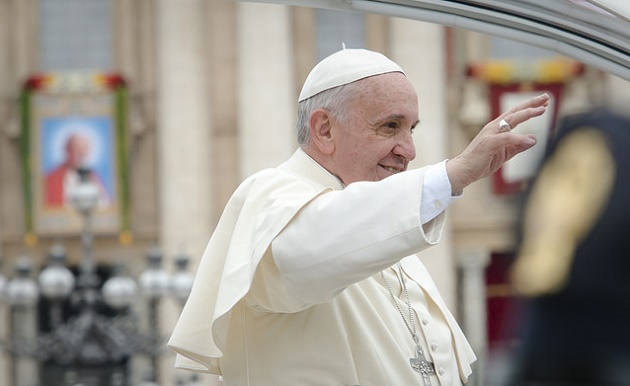According to the Pope, mercy achieves justice by avoiding tribunals, sentences, and prices to be paid.
 Pope Francis. / Aletheia.org (Flickr, CC)
Pope Francis. / Aletheia.org (Flickr, CC)
Mercy is by far the most used word by Pope Francis. Actually, it is the interpretative key of his whole pontificate. A book on mercy by Cardinal Kasper was on Bergoglio’s bedside table when he was elected Pope, thus shaping his own personal reflections as he prepared to become pontiff. Mercy was the main rubric of the Synod of the Family when the Pope urged his church to apply less rigorously the “letter” of the teachings on sexuality and to listen more to the “spirit” of inclusion for those who live in various forms of irregular relationships. Mercy is the over-arching theme of the Jubilee Year which Francis indicted in order to offer a year-long display of mercy through the system of indulgences. It is not surprising, therefore, that mercy is also the main theme of his recent speeches where he expounds it and unfolds it. The last instance was the general audience given on February 3rd in Saint Peter’s square.[1]
Mercy and Justice
The vexed question of the relationship between mercy and justice is central to the Pope’s meditation. Here is how he sets the tone of it: “Sacred Scripture presents God to us as infinite mercy and as perfect justice. How do we reconcile the two?” There seems to be a contradiction between God’s mercy and God’s justice. One way of connecting mercy and justice is through “retributive justice” which “inflicts a penalty on the guilty party, according to the principle that each person must be given his or her due”. Justice is done when one receives what is owed to him. Francis makes reference to a couple of Bible verses that show retributive justice at work but he wants to challenge it. “This path does not lead to true justice because in reality it does not conquer evil, it merely checks it. Only by responding to it with good can evil be truly overcome”. The unnecessary implication here is that retributive justice never produces any good. Does it not?
There is a far better way of doing justice according to Francis. “It is a process that avoids recourse to the tribunal and allows the victim to face the culprit directly and invite him or her to conversion, helping the person to understand that they are doing evil, thus appealing to their conscience. And this is beautiful: after being persuaded that what was done was wrong, the heart opens to the forgiveness being offered to it. This is the way to resolve conflicts in the family, in the relationship between spouses or between parents and children, where the offended party loves the guilty one and wishes to save the bond that unites them”. According to the Pope, mercy achieves justice by avoiding tribunals, sentences, and prices to be paid. A whole chunk of what the Bible teaches on justice is chopped out and replaced by a merciful and atonement-less justice. Is it God’s justice though?
This is God’s paradigm of mercy, says Francis. “This is how God acts towards us sinners. The Lord continually offers us his pardon and helps us to accept it and to be aware of our wrong-doing so as to free us of it”. What is happening here? No reference is made to the cross, the penalty of sin that was paid there, the wonder of Jesus Christ being punished on our behalf, the need for repentance and conversion for those who believe. Mercy seems to relinquish the cross. The point is that biblical atonement is totally missing here and the resulting view of mercy and justice is severely flawed.
What About Atonement?
Unfortunately, this is a seriously faulty teaching. Atonement-free justice is one of the popular ways to re-imagine God’s dealings with sin which is practiced by significant trends in contemporary theology. All that sounds connected to punishment, in execution of a lawful sentence, objectively imparted, etc. is seen as belonging to an out-fashioned, patriarchal, legalistic understanding of justice that needs to be overcome by a merciful, restorative, loving extension of pardon. In other words, what contemporary theology seems to reject are the basics of covenant justice instituted by the covenant God of Scripture. This justice presents a righteous Father who is also love, who sent his Son, the God-man Jesus, to pay for sin in order to bring salvation. Fulfilling the Old Testament, Jesus is the Lamb of God who takes away the sin of the world (John 1:29). Through His sacrifice, He is God’s provision for the forgiveness of sin.
Biblical justice has the cross of Christ at the center (1 Corinthians 1:23): Jesus Christ bore our sin on the cross (1 Peter 2:24). Mercy is possible not because tribunals and sentences are left out and made redundant by an all-embracing love. Mercy is accomplished and displayed exactly because justice was satisfied: “without the shedding of blood there is no forgiveness of sin” (Hebrews 9:22). Not by us, but by our Substitute, Jesus Christ, who died on the cross for us (Romans 5:8). When Pope Francis speaks of mercy, is he missing this fundamental biblical truth?

Las opiniones vertidas por nuestros colaboradores se realizan a nivel personal, pudiendo coincidir o no con la postura de la dirección de Protestante Digital.
Si quieres comentar o